Down by the seaside, an array of rather lumpen large naked women are marching, posing, reclining, and even rolling over along the walls of the new Jerwood Gallery, delineated by William Scott (1913-1989). Scott’s centenary is being commemorated with an array of exhibitions and publications in Britain and America, and the market too is revving up with the publication of a four-volume catalogue of his oil paintings.
He was born in Scotland, brought up in Northern Ireland, trained at the Belfast College of Art and the Royal Academy in London, and was part of those several generations of British artists who slip from view and then emerge again into the light of critical consideration – and the art market. He had a long career teaching – pre-war for a year or so in his own art school in Brittany and then after the war at Corsham, the Bath Academy of Art, where his peer group included Peter Lanyon, Terry Frost, Kenneth Armitage – while he engaged with anybody who was anybody in the Anglo-American art world from Ben Nicolson to Mark Rothko.
There is a a kind of fearful, genteel timidity, cloaked in rusty oranges and bluish greys
He took the conventional, and made of it something odd and unexpected: his almost obsessive subject matter explored over decades was on the one hand the artefacts of the kitchen and on the other that art-school staple, the nude. He had a particular penchant for the ordinary utensil - the cooking spoon, the saucepan, the jug, outlines of pots and pans magnified, reposing in some serenity in an agreeable backdrop of terracotta or blue or creamy white, or solidly coloured in themselves. From these common forms he could make something of a peculiar strangeness, something almost surreal from the familiar and the overlooked. The compositions, on a scale from the domestic to the substantial, waver between captivating boldness and irritating blandness. (Pictured below, Red Figure, 1954)
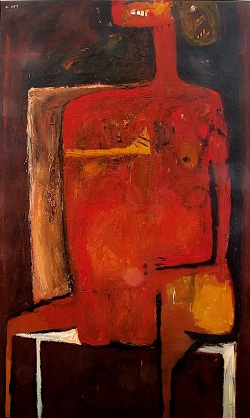 The Jerwood show mostly concentrates on the female form, solid and primitive, echoing ancient Cycladic sculptures transposed into paint. Scott’s handsome, tasteful work is situated in that visual area that borders on one side abstraction and the other recognisable figurative elements. It is evident that Scott is in meditative mode distilling observation into reductive but recognisable form.
The Jerwood show mostly concentrates on the female form, solid and primitive, echoing ancient Cycladic sculptures transposed into paint. Scott’s handsome, tasteful work is situated in that visual area that borders on one side abstraction and the other recognisable figurative elements. It is evident that Scott is in meditative mode distilling observation into reductive but recognisable form.
His women are blocky, chunky, monumental, and in spite of the variegated texture of creamy paint, curiously austere, dependent on outline and blocks of colour and so, however rounded, almost defiantly two-dimensional. It is as though the artist were working on designs, and it is possible to visualise his minimalist drawings of sprawled women neatly transposed onto mugs and plates and tea towels.
There is an occasional flare of liveliness, particularly in several large drawings of female forms reduced to several sweeping black lines. But the inclusion of several still lifes, arrays of those relentless rows of pots and pans, points out the difficulty. Scott’s nudes are mostly inert, they might just as well be – well, saucepans. There is a deadening solemnity, a kind of aching good taste, taking in the frenzy of visual innovation which artists were rushing to embrace at the time (1950s-1970s) and draining it of life. Scott was keenly aware of the weight of art history, and the current tumult of invention and, as he said himself, was “interested in the modern magic of space, primitive sex forms, the sensual and the erotic, disconcerting contours, the things of life”.
But life is just what is missing. It is an exhibition that reminds us all too vividly of that besetting problem of much 20th-century British art: a kind of fearful, genteel timidity, cloaked in rusty oranges and bluish greys. And it is certainly not the muddy palette that is the problem – think Sickert – but what you do with it that matters. On this evidence, Scott’s solemn nudes are all too polite, with nothing to say.




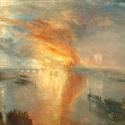

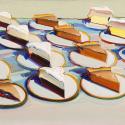



![SEX MONEY RACE RELIGION [2016] by Gilbert and George. Installation shot of Gilbert & George 21ST CENTURY PICTURES Hayward Gallery](/sites/default/files/styles/thumbnail_125_x_125_/public/mastimages/Gilbert%20%26%20George_%2021ST%20CENTURY%20PICTURES.%20SEX%20MONEY%20RACE%20RELIGION%20%5B2016%5D.%20Photo_%20Mark%20Blower.%20Courtesy%20of%20the%20Gilbert%20%26%20George%20and%20the%20Hayward%20Gallery._0.jpg?itok=3oW-Y84i)
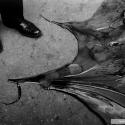

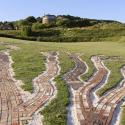

Add comment